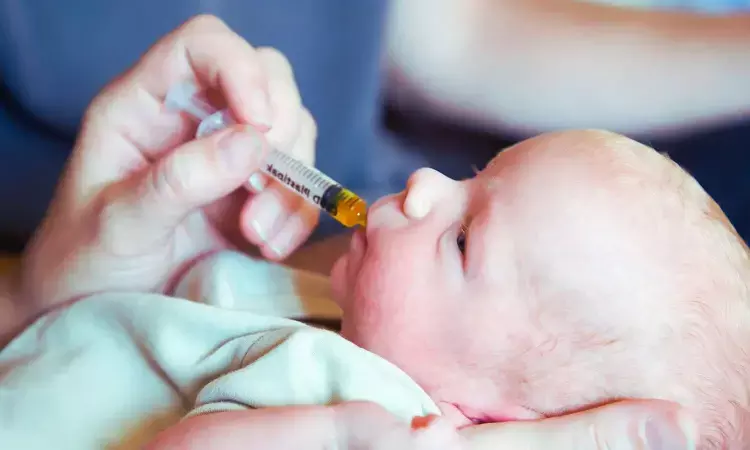- Home
- Medical news & Guidelines
- Anesthesiology
- Cardiology and CTVS
- Critical Care
- Dentistry
- Dermatology
- Diabetes and Endocrinology
- ENT
- Gastroenterology
- Medicine
- Nephrology
- Neurology
- Obstretics-Gynaecology
- Oncology
- Ophthalmology
- Orthopaedics
- Pediatrics-Neonatology
- Psychiatry
- Pulmonology
- Radiology
- Surgery
- Urology
- Laboratory Medicine
- Diet
- Nursing
- Paramedical
- Physiotherapy
- Health news
- Fact Check
- Bone Health Fact Check
- Brain Health Fact Check
- Cancer Related Fact Check
- Child Care Fact Check
- Dental and oral health fact check
- Diabetes and metabolic health fact check
- Diet and Nutrition Fact Check
- Eye and ENT Care Fact Check
- Fitness fact check
- Gut health fact check
- Heart health fact check
- Kidney health fact check
- Medical education fact check
- Men's health fact check
- Respiratory fact check
- Skin and hair care fact check
- Vaccine and Immunization fact check
- Women's health fact check
- AYUSH
- State News
- Andaman and Nicobar Islands
- Andhra Pradesh
- Arunachal Pradesh
- Assam
- Bihar
- Chandigarh
- Chattisgarh
- Dadra and Nagar Haveli
- Daman and Diu
- Delhi
- Goa
- Gujarat
- Haryana
- Himachal Pradesh
- Jammu & Kashmir
- Jharkhand
- Karnataka
- Kerala
- Ladakh
- Lakshadweep
- Madhya Pradesh
- Maharashtra
- Manipur
- Meghalaya
- Mizoram
- Nagaland
- Odisha
- Puducherry
- Punjab
- Rajasthan
- Sikkim
- Tamil Nadu
- Telangana
- Tripura
- Uttar Pradesh
- Uttrakhand
- West Bengal
- Medical Education
- Industry
DHA supplementation to infants born at less than 29 weeks gestation may not improve behaviour later: JAMA

Australia: In infants born at less than 29 weeks of gestation, increasing neonatal docosahexaenoic acid (DHA) supplementation did not influence behaviour in early childhood, according to findings from a follow-up of a randomized clinical trial (RCT). The findings appeared online in JAMA Pediatrics on November 20, 2023.
In the follow-up of an RCT of an enteral DHA emulsion in 958 infants born at less than 29 weeks gestation, the researchers found no evidence for differences in parent-rated behavioural functioning at 5 years of corrected age. Also, there were no indications of adverse effects with DHA supplementation.
Infants born at less than 29 weeks gestation are at risk of behavioural difficulties. This could be due to a lack of transplacental supply of DHA, a key fatty acid with functional and structural roles in the brain. Jacqueline F. Gould, South Australian Health and Medical Research Institute, North Adelaide, South Australia, Australia, and colleagues aimed to determine whether meeting the neonatal DHA requirement through supplementation improves the behavioural functioning of children born at less than 29 weeks gestation.
The researchers followed up with children from 10 Australian participating centres in a blinded, multi-centre, parallel-group RCT of infants born at less than 29 weeks gestation conducted from 2012 to 2015. Those with additional fatty acid supplementation or major congenital or chromosomal abnormalities were excluded. Parents of surviving children who had not withdrawn from the original trial were invited to complete questionnaires when the child turned five years of age.
731 children (76% of 958 surviving eligible children) were randomized to receive daily enteral emulsions providing 60 mg/kg/d of DHA (n=361; intervention group) or a soy-oil emulsion (with no DHA; control group, n=370) from within the first 3 days of enteral feeding until 36 weeks' discharge home or postmenstrual age, whichever occurred first. Of these 731, 452 were female, and the mean corrected age at follow-up was 5.4 years.
The researchers reported the following findings:
- Following imputation for missing data, the mean Total Difficulties score was the same in both groups (intervention group, n = 465; mean, 11.8; control group, n = 493; mean, 11.8; mean difference adjusted for sex, gestational age stratum, and hospital, 0.01).
- There was no evidence for differences between the groups in any secondary outcomes of behaviour, executive functioning, or health.
- DHA supplementation had little impact on health or health-related quality of life at 5 years corrected age.
- There were no differences in wheezing and asthma at 5 years corrected age between the randomized groups, providing some reassurance that the DHA-associated increase in the risk of bronchopulmonary dysplasia (BPD) observed during the neonatal period was not evident in the longer term.
"In this follow-up of a randomized clinical trial, DHA supplementation of infants born at less than 29 weeks gestation failed to improve behavioural functioning at age 5 years," the researchers wrote. "There was no evidence of long-term adverse health outcomes with DHA supplementation."
Reference:
Gould JF, Roberts RM, Anderson PJ, et al. High-Dose Docosahexaenoic Acid in Newborns Born at Less Than 29 Weeks’ Gestation and Behavior at Age 5 Years: Follow-Up of a Randomized Clinical Trial. JAMA Pediatr. Published online November 20, 2023.
doi:10.1001/jamapediatrics.2023.4924
Dr Kamal Kant Kohli-MBBS, DTCD- a chest specialist with more than 30 years of practice and a flair for writing clinical articles, Dr Kamal Kant Kohli joined Medical Dialogues as a Chief Editor of Medical News. Besides writing articles, as an editor, he proofreads and verifies all the medical content published on Medical Dialogues including those coming from journals, studies,medical conferences,guidelines etc. Email: drkohli@medicaldialogues.in. Contact no. 011-43720751


